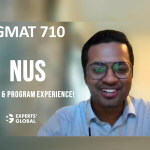Verbatim
Experts’ Global: Hi Minbo, thanks for making the time to speak with us! Could you share your story in your words?
Minbo: The journey for my MBA was uneven. I could only get a 640 on the GMAT, but I did very well with my application materials and secured admits from both the MBAs I applied to. Working with MBA admissions consultants Experts’ Global for my applications was a good move, as they guided me in self-reflection and understanding the most unique aspects and stories of my life path. The chance to dig deep into my professional history gave me a lot of confidence that I deserved to pursue an MBA, and this confidence was reflected in my MBA interviews as well.
Experts’ Global: In hindsight, what mistakes did you make along the way?
Minbo: On the GMAT, I incorrectly estimated the test’s difficulty level. My prior education did not employ English as the language of instruction, and preparing for the Verbal section of the GMAT was quite a challenge for me. I would advise other applicants like me to focus on building their Verbal skills as well as they can for the GMAT.
Also, take the GMAT as early as you can as the score stays valid for five years after you get it. Having a GMAT score in hand early makes it easier for you to apply in round one of your targeted MBAs admissions processes, and boosts your scholarship chances.
Experts’ Global: What were the main GMAT prep resources you used?
Minbo: With time, I found out that the official material from the GMAT website must be your go-to. Resources such as Manhattan Prep can help you practice the nuances of Verbal, but the official material should be your core prep resources. Taking GMAT mocks is also necessary.
Experts’ Global: What frequency of GMAT mock testing should applicants target?
Minbo: I think that taking a GMAT mock at least once a week during your prep is a good idea. Start your GMAT studies by taking a free GMAT practice test to figure out your strengths and weaknesses and then work to cover for the latter. Therefore, taking mocks once a week will help you track your progress. A month before your actual GMAT is scheduled, start taking two mocks every week, to get your mental conditioning for the exam in place.
Experts’ Global: How was your experience with applying to business schools and what things did you do correctly to secure your admit?
Minbo: At the beginning of my application process, I was not very sure about what MBAs I should target. Reaching out for professional help with my application was a good first step. Talking to the admissions outreach team from the schools I applied to also helped me, as I was able to get a sense of the kind of questions I would be asked in the MBA interview from them.
As I began to work on my application materials, I came to view my rural upbringing as an advantage instead of a drawback, as it gave me a unique perspective to help me stand out through my essays and my answers in the interviews.
Experts’ Global: With what area of the application process did you struggle the most and how did you overcome the difficulty?
Minbo: The biggest struggle was in being sure that I knew myself and was telling my story effectively in the application. While working on my applications, I had a full-time job and family duties to attend to as well, which made making time for the essay work challenging.
Experts’ Global: What lesson did you take away from managing the application timelines?
Minbo: I learned to employ the urgent-important matrix. With this framework, I was able to divide different tasks in the application process into the categories of urgent and important and deploy my energies accordingly. Having a professional team guiding me through the application process also helped me stay on track with the work therein.
Experts’ Global: How was your MBA interview experience?
Minbo: I applied to just two schools, NTU and SMU. At NTU, the admissions team was quite friendly, and is happy to help one optimize one’s chances of getting a job successfully after the MBA. At SMU, my interviewer asked me unusual questions as he himself had previous experience with my industry.
Communicating a unique viewpoint on my professional path was a challenge, but I was able to show that I have the business acumen to understand the opportunities and problems in my field. Having in-depth knowledge about your domain and having your MBA interview prep done well is highly recommended.
Experts’ Global: What common mistakes should all GMAT and MBA aspirants avoid?
Minbo: Make sure to get your GMAT score in hand early. During your GMAT prep, keep a sharp log of your errors. Find patterns in your mistakes and address the conceptual flaws they reveal. Since full-time employment makes it difficult to study well for the GMAT, use a high-quality GMAT online course or one-on-one coaching to make the most of your studies. Working on the MBA applications themselves is quite time-consuming, as you will need to dig deep to come up with a convincing story to present.
Experts’ Global: What is your final message to MBA aspirants out there?
Minbo: Be confident in your abilities, hire professional help for your MBA applications if you have the financial ability to do so, and learn all you can from the free resources and stories from other successful MBA students you will find through your research!
Experts’ Global: Thank you for sharing this wisdom with us today, Minbo!
Minbo: No worries!







